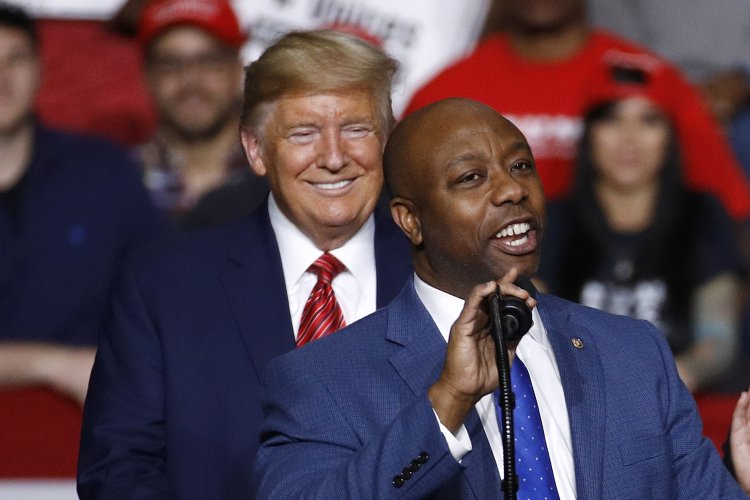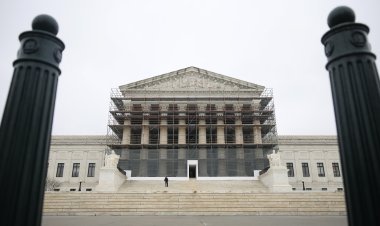Scott remains quiet while his minority business legacy deteriorates under Trump
Sen. Tim Scott has strongly advocated for assisting minority businesses and underserved communities in gaining access to capital.

Scott played a crucial role in congressional efforts to secure permanent funding for the Commerce Department’s Minority Business Development Agency (MBDA), broaden its services in rural areas, and utilize the program to assist minority-owned businesses during the Covid-19 pandemic.
Currently, however, the program, which offers grants to business owners and provides essential technical assistance, support, and mentorship, has seen all of its staff—approximately 50 individuals—placed on administrative leave or reassigned within the Commerce Department, according to a Commerce employee and a Democratic staffer who spoke anonymously to discuss personnel matters.
For years, Scott has focused on improving access to capital and economic mobility for underprivileged communities, akin to the one he claims to have grown up in, as well as for minority businesses, like his own Main Street insurance agency. The MBDA has been a critical avenue for this mission since its inception during the Nixon era. Despite its significance, Scott has notably refrained from publicly addressing the agency's reduction.
“They are watching this happen, and they are doing nothing. That’s cowardice. And it cuts especially deep when the people you once believed were your champions turn their backs in silence,” remarked the Commerce Department employee regarding the silence of Scott and other Republicans about the program's cuts.
Having campaigned for Trump and previously considered as a potential vice presidential candidate for 2024, Scott's reticence emphasizes the delicate balance he and other Black conservatives must maintain between personal interests and party loyalty amidst the administration's broader efforts to undermine diversity-focused initiatives.
A spokesperson for Scott pointed to his track record of working with Trump to achieve “life-changing results for minority communities around the nation.” They highlighted Scott's endeavors during Trump’s first term, like securing permanent funding for historically Black colleges and universities, creating “opportunity zones” under the 2017 Tax Cuts and Jobs Act, and tax reductions for single mothers.
“Their vision of America is one that allows every American, no matter their background, to have the necessary tools and resources to achieve their American dream. Senator Scott and President Trump are undoubtedly working to make sure our country works for all hard-working Americans,” the spokesperson stated.
Scott and other Republican leaders have expressed support for the mission of the minority business program but suggested that the agency should change its name to diminish political controversy, according to one of the Commerce Department employees.
The recent reduction of agency resources stands in stark contrast to Scott’s ongoing efforts to increase economic access for underserved communities and minority entrepreneurs. His Empowering Main Street in America Act aimed to enhance capital access for small businesses, particularly minority, women-owned, and rural enterprises. Although the bill faltered in Congress last year, Scott indicated last month that he intends to persist in advocating for the legislation.
Scott, collaborating with other senators, promoted bipartisan legislation incorporated into a 2021 infrastructure and jobs bill, which established permanent authorization for the MBDA and facilitated the creation of rural business centers at historically Black colleges and universities. Scott emphasized during a 2020 U.S. Chamber of Commerce conversation that “by having more MBDAs located around the country especially in the rural areas, you’ll bring expertise to those would-be entrepreneurs and you’ll better equip them for success.”
During the pandemic, Scott noted that he secured an additional $10 million as part of a Covid-19 relief package to help the MBDA connect minority-owned businesses to the Paycheck Protection Program, which provided crucial financial support to companies during the crisis.
“Small businesses—barber shops and beauty salons and landscapers—are in abundance in the African-American community. They are some of the hardest working people you know and they need to understand and know that the resources are there,” Scott mentioned in a 2020 interview on ABC’s The View.
With the recent cuts, the MBDA is expected to struggle in delivering essential programs such as the Capital Readiness Program, which aids in accessing funding and provides necessary technical help. A national network of business centers is being closed, and contractors are being let go. The MBDA has not communicated the status of grants to those recipients, leaving them without direction, according to two Commerce Department employees.
Now, only a deputy secretary, an acting under secretary, and a DOGE employee remain, as indicated by one of the Commerce Department staffers.
Requests for comments from the U.S. Department of Commerce, U.S. Department of Labor, and the Department of Government Efficiency went unanswered.
Trump has historically been in favor of shuttering the MBDA, proposing significant cuts or closure of the agency in budget proposals throughout his four-year tenure.
On March 14, he issued an executive order mandating that the MBDA reduce its operations and personnel to the bare minimum allowed by law.
The situation unfolding at the MBDA is described as “unprecedented” by a Commerce Department employee. “A lawful federal agency being functionally eliminated through verbal instruction, without public transparency, process or regard for its statutory basis.”
Congressional Democrats, led by Financial Services Ranking Member Maxine Waters, assert that dismantling the agency “represents yet another unlawful and dangerous attempt to undermine a congressionally established institution vital to our nation’s economy.”
On the other hand, Scott’s supporters maintain that he will continue to back minority-owned enterprises but may need to modify his approach in light of the new Trump administration.
Stephen Gilchrist, chair of the South Carolina African American Chamber of Commerce and a Trump-appointed commissioner of the U.S. Commission on Civil Rights, stated that Scott “will work with the administration to find a path to make sure that this work continues” to ensure that “African American and other minority businesses can truly gain access to capital and the resources that they need.”
Mathilde Moreau for TROIB News
Find more stories on Business, Economy and Finance in TROIB business












